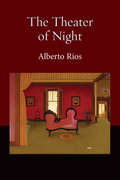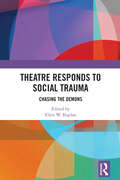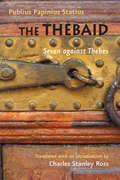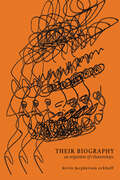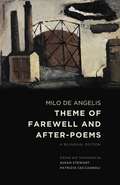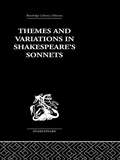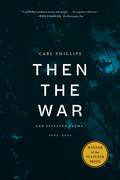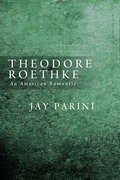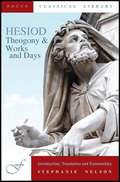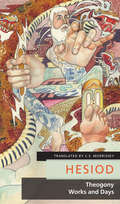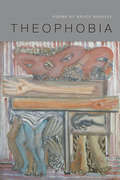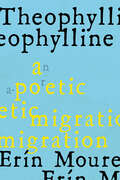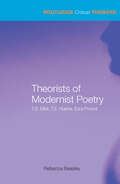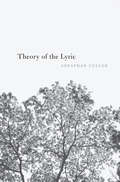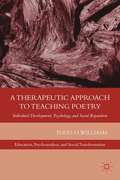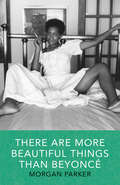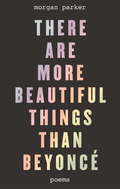- Table View
- List View
The Theater of Night
by Alberto RíosNow in paperback, and following the success of his National Book Award nomination, Alberto Ríos’ new book is filled with magic, marvel, and emotional truth. Set along the elusive southern border, his poems trace the lives and loves of an elderly couple through their childhood and courtship to marriage, maturity, old age, and death. Like the best of storytellers, Ríos charms his readers, making us care deeply—even love—these people we read.
Theatre Responds to Social Trauma: Chasing the Demons (Routledge Series in Equity, Diversity, and Inclusion in Theatre and Performance)
by Ellen W. KaplanThis book is a collection of chapters by playwrights, directors, devisers, scholars, and educators whose praxis involves representing, theorizing, and performing social trauma.Chapters explore how psychic catastrophes and ruptures are often embedded in social systems of oppression and forged in zones of conflict within and across national borders. Through multiple lenses and diverse approaches, the authors examine the connections between collective trauma, social identity, and personal struggle. We look at the generational transmission of trauma, socially induced pathologies, and societal re-inscriptions of trauma, from mass incarceration to war-induced psychoses, from gendered violence through racist practices. Collective trauma may shape, protect, and preserve group identity, promoting a sense of cohesion and meaning, even as it shakes individuals through pain. Engaging with communities under significant stress through artistic practice offers a path towards reconstructing the meaning(s) of social trauma, making sense of the past, understanding the present, and re-visioning the future.The chapters combine theoretical and practical work, exploring the conceptual foundations and the artists’ processes as they interrogate the intersections of personal grief and communal mourning, through drama, poetry, and embodied performance.
The Thebaid: Seven against Thebes (Johns Hopkins New Translations from Antiquity)
by Publius Papinius StatiusA classical epic of fratricide and war, the Thebaid retells the legendary conflict between the sons of Oedipus—Polynices and Eteocles—for control of the city of Thebes. The Latin poet Statius reworks a familiar story from Greek myth, dramatized long before by Aeschylus in his tragedy Seven against Thebes. Statius chose his subject well: the Rome of his day, ruled by the emperor Domitian, was not too distant from the civil wars that had threatened the survival of the empire. Published in 92 A.D., the Thebaid was an immediate success, and its fame grew in succeeding centuries. It reached its peak of popularity in the later Middle Ages and Renaissance, influencing Dante, Chaucer, and perhaps Shakespeare. In recent times, however, it has received perhaps less attention than it deserves, in large part because there has been no accessible, dynamic translation of the work into English.Charles Stanley Ross offers a compelling version of the Thebaid rendered into forceful, modern English. Casting Statius's Latin hexameter into a lively iambic pentameter more natural to the modern ear, Ross frees the work from the archaic formality that has marred previous translations. His translation reinvigorates the Thebaid as a whole: its meditative first half and its violent second half; its intimate portrayal of defeat and retribution, and the need to seek justice at any cost. In a wide-ranging introduction, Ross provides an overview of the poem: its composition, reception and legacy; its major themes and literary influences; and its place in Statius' life. And in a helpful series of notes, he offers background information on the major characters and incidents.
their biography: an organism of relationships
by Kevin Mcpherson EckhoffWould it be possible to compose a book that appears to be "about" its author, but is indirectly about something else, like identity or relationships or language? Maybe a book not written by a hero... but by many?This was the challenge taken up by Kevin McPherson Eckhoff in his fourth book, their biography: an organism of relationships. This collaborative memoir collages together word-portraits from friends, family, coworkers, strangers, robots, and even adversaries in order to create a silhouette of not a single person, but of the manacles that connect people to one another.their biography is meant to make people think--it's broad array of voices and poetic/prosaic forms disturbs comfortable patterns of reading, and its subject is as much about the contributors as the author. Eclectic and desolate, confessional and dubious, this record of relationships defies authorship, biography, and individualism.Fans of Gregory Betts's "Facebook Poem Project" or Rachel Zolf's Tolerance Project, along with anyone compelled by contemporary poetry and conceptual art, will connect with this pixelated investigation into identity, and the true meaning of 'self' as we and others define it.
Theme of Farewell and After-Poems: A Bilingual Edition
by Milo De Angelis Patrizio Ceccagnoli Susan StewartMilo De Angelis, born in 1951, is one of the most important living Italian poets. With this volume, Susan Stewart and Patrizio Ceccagnoli bring to English readers for the first time a facing-page edition of his most recent work: his book-length elegy, Theme of Farewell, and the subsequent poems of That Wandering in the Darkness of Courtyards. These two books form a sequence narrating the illness and premature death, in 2003, of the poet's wife, the writer Giovanna Sicari, a celebrated poet in her own right; they also trace De Angelis's turn from grief, through time, back to the world. Immediate, perceptive, and woven from the fabric of everyday life in contemporary Milan, the poems never depart from universal human emotions of despair and awakening. Throughout his long career, De Angelis has renewed lyric poetry with the sheer intensity of his forms and insights, and the volumes offered here have won some of the most important Italian literary awards, including the coveted Premio Viareggio. These inexorable and beautifully crafted translations will be of interest to scholars of contemporary Italian literature, students of contemporary poetry and literary translation, and those who work in comparative literature. Above all, they are bound to speak to any reader in search of a poet writing at the height of his powers of expression.
Themes and Variations in Shakespeare's Sonnets
by J B LeishmanFirst published in 1961. This study analyses Shakespeare's treatment of the universal themes of Beauty, Love and Time. He compares Shakespeare with other great poets and sonnet writers - Pindar, Horace and Ovid, with Petrarch, Tasso and Ronsart, with Shakespeare's own English predecessors and contemporaries, notably Spenser, Daniel and Drayton and with John Donne. By discussing their resemblances and differences, a not altogether orthodox picture of Shakespeare's attitude to life is presented, which suggests that he was not as phlegmatic and equable a person as critics have often supposed.
Then the War: and Selected Poems, 2007-2020
by Carl PhillipsA new collection of poems from one of America’s most essential, celebrated, and enduring poets, Carl Phillips's Then the War <p><p> I’m a song, changing. I’m a light <p>rain falling through a vast <p> darkness toward a different <p>darkness. <p><p> Carl Phillips has aptly described his work as an “ongoing quest;” Then the War is the next step in that meaningful process of self-discovery for both the poet and his reader. The new poems, written in a time of rising racial conflict in the United States, with its attendant violence and uncertainty, find Phillips entering deeper into the landscape he has made his own: a forest of intimacy, queerness, and moral inquiry, where the farther we go, the more difficult it is to remember why or where we started. <p><p> Then the War includes a generous selection of Phillips’s work from the previous thirteen years, as well as his recent lyric prose memoir, “Among the Trees,” and his chapbook, Star Map with Action Figures. <p><p> Ultimately, Phillips refuses pessimism, arguing for tenderness and human connection as profound forces for revolution and conjuring a spell against indifference and the easy escapes of nostalgia. Then the War is luminous testimony to the power of self-reckoning and to Carl Phillips as an ever-changing, necessary voice in contemporary poetry.
Thendral: Vol. 14, Issue 03, February 2014
by MadhurabharathiThis issue features interviews with veterans Padmashree S.M.Ganapathy Sthapathy, Madurai G.S.Mani, mouth-watering recipes, homage to many veterans, short stories,an article on 37th book fair and other usual features like Ilanthendral , Kathiravanai Kelungal, Nalam Vaazha etc.
Thendral: Vol. 14, Issue 05, April 2014
by MadhurabharathiThis issue features an interview with Kalakshetra’s Director Priyadarshini Govind , two short stories, ‘Payanam’ talks about a visit to Marymoor Park in Washington, ‘Samayam’ features Ayirathen Vinayagar temple, an article paying homage to T.K.Sivasankaran and Kushvanth Singh, mouth watering recipes, an article on Achievers featuring Kuralarasi Geetha Arunachalam and a few other young achievers ,an article on the veteran writer Kumuthini along with usual features like Thendral Pesukirathu ,Kathiravanai Kelungal,Nalam Vaazha, Kavithai Pandhal, Pudhinam and important events of last month.
Thendral: Vol. 14, Issue 6 May 2014
by MadhurabharathiThis issue features an interview with Mekala Ramamoorthy and Na.Muthukumar, two short stories , an article on Pioneer Dr.Rajammal Devdoss and another on writer Rajendra Chozhan , mouth watering recipes, ‘Samayam’ featuring a Needamangalam Sri Santhana Ramasamy temple, an aricle paying homage to S. Sripal along with usual features like Thendral Pesukirathu , Kathiravanai Kelungal, Nalam Vaazha, Kavithai Pandhal, Pudhinam and important events of last month.
Thendral: Vol. 14, Issue 07, June 2014
by MadhurabharathiThis issue features an interviews with Arunachalam Muruganandam and Siripananda, few short stories , an article on Pioneer Navalar Na.Mu.Venkatasamy Nattar and another on writer Kadugu ,a couple of mouth watering recipes, a special feature on Narendra Modi along with usual features like Thendral Pesukirathu , Kathiravanai Kelungal, Nalam Vaazha, Kavithai Pandhal and important events of last month.
Thendral: Vol. 14, Issue 08, July 2014
by MadhurabharathiThis issue features an interviews with Professor Arogyasamy Palraj and Bombay kannan, few short stories , an article on Pioneer P.T.Srinivasa Iyengar,a couple of mouth watering recipes, Samayam featuring Marudamalai Murugan temple, along with usual features like Thendral Pesukirathu , Kathiravanai Kelungal, Nalam Vaazha, Kavithai Pandhal and important events of last month.
Thendral: Vol. 14, Issue 09, August 2014
by MadhurabharathiThis issue features interviews with T.V.Varadarajan, ‘Nalla Keerai’ Jagannathan , a special coverage on the volunteer driven NGO -- North South Foundation, a feature on ‘Transactions Of Belonging’ – a book by Jeya Padmanabhan, a couple of mouth watering recipes,Samayam featuring the Ragu –Kethu sthalas : Thirunageshwaram and Keelperumpallam, an article on writer Kalaniyuran, a few short stories , an article paying homage to veteran journalist ‘Vandumama’, another article on young achievers along with usual features like Thendral Pesukirathu , Anbulla Snehitiye, Kathiravanai Kelungal, Kavithai Pandhal etc and important events of last month.
Theodore Roethke
by Jay PariniJay Parini's biography of the poet, Theodore Roethke. Parini views Roethke through the lens of a Romantic poet. <P><P>With this incredibly researched and well written work, Parini reaffirms Roethke's reputation as a poet that came into his own after the publication of "The Lost Son," and then continued to develop from there and greatly extended his reputation with further works.
Theogony And Works And Days
by Stephanie Nelson Edited Translated By Richard Caldwell HesiodGreek poet Hesiod took many lines of thought and knowledge - myth, fable, personal experience, practical understanding - and wove them into one great whole. He did as much with the origins of the Greek gods in the Theogony, and then did the same in creating his manual of moral and practical advice, Works and Days. Here, Stephanie Nelson's translation of Works and Days is paired with Richard S. Caldwell's take on the Theogony. Along with introductory essays, these comprehensible versions of Hesiod's two best-known poems make it easy for readers to see why Hesiod's writings continue to resound through the ages.
Theogony / Works and Days
by Eric Voegelin Hesiod Roger Scruton C. S. MorrisseyPhilosopher C.S. Morrissey adapts Hesiod's two great works, Theogony and Works and Days, taking into account the poet's essential meditative insights that paved the way for the subsequent achievements of Greek philosophy,most notably of Plato, and thereby gave a distinctive shape to all of Western philosophy. Theogony recounts the genesis of the first generations of the Greek gods and recollects how Zeus used both force and persuasion to establish his cosmic reign of justice. Works and Days tells the story of the origin and ordination of human beings within this cosmos and their perennial struggle to win order from disorder in a world overwhelmed by harsh sorrows and injustice.In the wake of personal adversity and suffering, Hesiod was inspired by the Muses to sing out against the untruth of society and to disclose the truth about justice in the cosmos. Theogony, which won him his laurels in a poetic competition, begins by telling of how the Muses chose him as an individual vessel of inspiration, to be a rival to Homer and the old myths with a newer vision of the struggle for justice among the gods. In Works and Days, Hesiod includes these autobiographical details within a reflection on the two-fold role of competition in life: "the bad strife" is visible everywhere in the manifold forms of universal disorder, although "the good strife" is part of the struggle to maintain order in the wake of chaos and the primeval void.These new translations are contextualized with a foreword by distinguished philosopher Roger Scruton and text by the late philosopher and historian Eric Voegelin, who argues the magnitude of Hesiod's influence on Greek philosophy and Western history, and how his sublime contribution to literature has formed a signal bridge between myth and metaphysics.
Theophobia (American Poets Continuum #136.00)
by Bruce BeasleyTheophobia is the latest volume in Bruce Beasley's ongoing spiritual meditation which forms a kind of postmodern devotional poetry in a reinvention of the tradition of John Donne, George Herbert, Emily Dickinson, Gerard Manley Hopkins, and T. S. Eliot. Theophobia is structured around a series of poems called "Pilgrim's Deviations" and forms a deviant and deviating pilgrimage through science, history, politics, and popular culture. Beasley seeks the Biblical Kingdom of God among Dolly the cloned sheep, the wonders and horrors of extremophilic creatures living in astonishing intensities of temperature, robotic phone operators, and Wikipedia's explanation of the mysteries of the Holy Spirit. Bruce Beasley is the author of six poetry collections, most recently The Corpse Flower: New and Selected Poems (University of Washington Press, 2007). He has won fellowships from the NEA and the Artist Trust of Washington and three Pushcart Prizes.
Theophobia
by Bruce BeasleyTheophobia is the latest volume in Bruce Beasley's ongoing spiritual meditation which forms a kind of postmodern devotional poetry in a reinvention of the tradition of John Donne, George Herbert, Emily Dickinson, Gerard Manley Hopkins, and T. S. Eliot. Theophobia is structured around a series of poems called "Pilgrim's Deviations" and forms a deviant and deviating pilgrimage through science, history, politics, and popular culture. Beasley seeks the Biblical Kingdom of God among Dolly the cloned sheep, the wonders and horrors of extremophilic creatures living in astonishing intensities of temperature, robotic phone operators, and Wikipedia's explanation of the mysteries of the Holy Spirit. Bruce Beasley is the author of six poetry collections, most recently The Corpse Flower: New and Selected Poems (University of Washington Press, 2007). He has won fellowships from the NEA and the Artist Trust of Washington and three Pushcart Prizes.
Theophylline: A Poetic Migration via the Modernisms of Rukeyser, Bishop, Grimké (de Castro, Vallejo)
by Erín Moure Elisa SampedrínWhat is breath for? What is archive? Why write a poem, instead of... something else? Theophylline is a work of poetry motivated by asthma, seeking poetry’s futurity in a queer and female heritage. Moure crosses a border to engage the poetry of three American modernists—Muriel Rukeyser, Elizabeth Bishop, and Angelina Weld Grimké—as a translator might enter work to translate it. But what if that work is already in English? Moure listens to rhythms, punctuation, conditions of production and reception, and finds migration patterns, queeritude, mother mimory, wars, silence, constraints on breath, and social bias played out in terms of race and/or class. Moving from present to past to a future in the unwritten; querying borders, jarred by intrusions from alter ego Elisa Sampedrín, Theophylline finishes with poems informed by pandemic walks and human aging that include two translations: from Rosalía de Castro, pre-modernist poet who wrote in Galician calling on women to speak, and from César Vallejo, the twentieth century Peruvian whose poetics shattered the colonial (Spanish) tongue.
Theorists of Modernist Poetry: T.S. Eliot, T.E. Hulme, Ezra Pound (Routledge Critical Thinkers)
by Rebecca BeasleyModernist poetry heralded a radical new aesthetic of experimentation, pioneering new verse forms and subjects, and changing the very notion of what it meant to be a poet. This volume examines T.S. Eliot, T.E. Hulme and Ezra Pound, three of the most influential figures of the modernist movement, and argues that we cannot dissociate their bold, inventive poetic forms from their profoundly engaged theories of social and political reform. Tracing the complex theoretical foundations of modernist poetics, Rebecca Beasley examines: the aesthetic modes and theories that formed a context for modernism the influence of contemporary philosophical movements the modernist critique of democracy the importance of the First World War modernism’s programmes for social reform. This volume offers invaluable insight into the modernist movement, as well as demonstrating the deep influence of the three poets on the shape and values of the discipline of English Literature itself. Theorists of Modernist Poetry is relevant not only to students of modernism, but to all those with an interest in why we study, teach, read and evaluate literature the way we do.
Theory of the Lyric
by Jonathan CullerWhat sort of thing is a lyric poem? An intense expression of subjective experience? The fictive speech of a specifiable persona? Theory of the Lyric reveals the limitations of these two conceptions of the lyric-the older Romantic model and the modern conception that has come to dominate the study of poetry-both of which neglect what is most striking and compelling in the lyric and falsify the long and rich tradition of the lyric in the West. Jonathan Culler explores alternative conceptions offered by this tradition, such as public discourse made authoritative by its rhythmical structures, and he constructs a more capacious model of the lyric that will help readers appreciate its range of possibilities. Theory of the Lyric constitutes a major advance in our understanding of the Western lyric tradition. Examining ancient as well as modern poems, from Sappho to Ashbery, in many European languages, Culler underscores lyric's surprising continuities across centuries of change-its rhythmical resources, its strange modes of address, its use of the present tense, and the intriguing tension between its ritualistic and fictional dimensions. He defends the idea of lyric as a genre against recent critiques, arguing that lyrics address our world rather than project a fictional world and also challenging the strongly established assumption that poems exist to be interpreted. Theory of the Lyric concludes with a discussion of how to conceive the relations between lyric and society in ways that would acknowledge and respond to lyric's enduring powers of enchantment.
A Therapeutic Approach To Teaching Poetry
by Todd O. WilliamsExplains how the study of poetry, by providing experiences similar to those produced by poetry therapy, can help students discover themselves and develop their potential to effect change in the world.
There Are More Beautiful Things Than Beyoncé
by Morgan ParkerThere Are More Beautiful Things Than Beyoncé uses political and pop-cultural references as a framework to explore 21st century black American womanhood and its complexities: performance, depression, isolation, exoticism, racism, femininity, and politics. <p> <p> The only thing more beautiful than Beyoncé is God, and God is a black woman sipping rosé and drawing a lavender bath, texting her mom, belly-laughing in the therapist’s office, feeling unloved, being on display, daring to survive. Morgan Parker stands at the intersections of vulnerability and performance, of desire and disgust, of tragedy and excellence. Unrelentingly feminist, tender, ruthless, and sequined, these poems are an altar to the complexities of black American womanhood in an age of non-indictments and deja vu, and a time of wars over bodies and power. These poems celebrate and mourn. They are a chorus chanting: You’re gonna give us the love we need.
There Are More Beautiful Things Than Beyoncé
by Morgan ParkerOne of Oprah Magazine's Ten Best Books of 2017A TIME Magazine Best Paperback of 2017Publishers Weekly's Ten Best Poetry Collections of SpringA Most Anticipated book at Buzzfeed, NYLON and BustleOne of i-D's emerging female authors to read in 2017 'Outstanding collection of poems. So much soul. So much intelligence in how Parker folds in cultural references and the experiences of black womanhood. Every poem will get its hooks into you. And of course, the poems about Beyoncé are the greatest because Beyoncé is our queen.' Roxane Gay 'I can and have read Morgan Parker's poems over and over . . . She writes history and pleasure and kitsch and abstraction, then vanishes like a god in about 13 inches.' Eileen Myles'Morgan Parker has a mind like wildfire and these pages are lit. I can't recall being this enthralled, entertained, and made alert by a book in a very long time.' Jami AttenbergThe only thing more beautiful than Beyoncé is God, and God is a black woman sipping rosé and drawing a lavender bath, texting her mom, belly-laughing in the therapist's office, feeling unloved, being on display, daring to survive. Morgan Parker stands at the intersections of vulnerability and performance, of desire and disgust, of tragedy and excellence. Unrelentingly feminist, tender, ruthless and sequinned, these poems are an altar to the complexities of black American womanhood in an age of non-indictments and déjà vu, and a time of wars over bodies and power. These poems celebrate and mourn. They are a chorus chanting: You're gonna give us the love we need.
